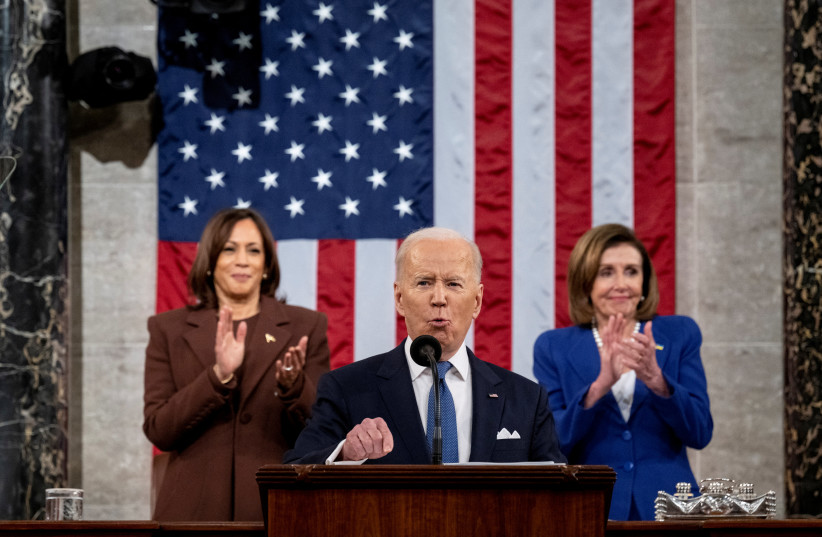WASHINGTON – A group of 49 Republican Senators – all but Kentucky Sen. Rand Paul – announced on Monday that they will not support efforts to revive the 2015 nuclear agreement with Iran.
They noted that according to press reports, the Biden administration might soon conclude an agreement with Iran “to provide substantial sanctions relief in exchange for merely short-term limitations on Iran’s nuclear program.”
“We strongly urge the administration, our Democrat colleagues, and the international community to learn the lessons of the very recent past,” they wrote. “A major agreement that does not have strong bipartisan support in Congress will not survive.
“Republicans have made it clear: We would be willing and eager to support an Iran policy that completely blocks Iran’s path to a nuclear weapons capability, constrains Iran’s ballistic missile program and confronts Iran’s support for terrorism,” the Senate Republicans continued. “But if the administration agrees to a deal that fails to achieve these objectives or makes achieving them more difficult, Republicans will do everything in our power to reverse it. Unless Iran ceases its support for terrorism, we will oppose removing and seek to reimpose any terrorism-related sanctions. And we will force the Senate to vote on any administration effort to do so.
“By every indication, the Biden administration appears to have given away the store,” they continued. “The administration appears to have agreed to lift sanctions that were not even placed on Iran for its nuclear activities in the first place, but instead because of its ongoing support for terrorism and its gross abuses of human rights.”

They went on to say that the nuclear limitations under the new deal “appear to be significantly less restrictive than the 2015 nuclear deal, which was itself too weak, and will sharply undermine US leverage to secure an actually ‘longer and stronger’ deal.
“What is more, the deal appears likely to deepen Iran’s financial and security relationship with Moscow and Beijing, including through arms sales,” they continued. “The administration has thus far refused to commit to submit a new Iran deal to the Senate for ratification as a treaty, as per its constitutional obligation, or for review under statutory requirements that passed on a bipartisan basis in response to the 2015 deal. Additionally, despite earlier promises to the contrary, the administration has failed to adequately consult with Congress.”
MEANWHILE, JEWISH and pro-Israel organizations are bracing for the possibility that an agreement will be signed soon. Last week, the American Jewish Committee sent a letter to Secretary of State Antony Blinken, expressing concerns over the details of the imminent deal. However, many other groups are waiting to see how the final deal will look before making public comments.
B’nai B’rith International CEO Dan Mariaschin told The Jerusalem Post that he was “deeply concerned” about what agreement might come out of the Vienna talks.
“If issues like Iranian missile and centrifuge development and manufacture, and snap, intrusive inspections of military sites, not to mention Iran’s menacing malign behavior throughout the region [are not addressed], what will have been the purpose of reentering talks with Tehran?” he said.
“And what of even-more truncated sunset clauses which would allow Iran to resume its nuclear program unfettered?” Mariaschin continued. “Moreover, reports that side agreements that might remove the Iranian Revolutionary Guards from terrorism lists, or which would pull back efforts to prosecute those Iranians who perpetrated such acts of terrorism as the attack on the AMIA social welfare building in Buenos Aires in 1994, should be of special concern.
“The P5+1 countries need to pause and think of the consequences of any agreement that leaves Iran to its own devices,” he said. “Sunday’s Iranian attack on Erbil is yet another example that the regime in Tehran cares less about negotiated agreements than it does about wanting to maintain its ability to act with impunity to advance its interests in the region.”
CUFI Action Fund chairwoman Sandra Parker told the Post that everything she has heard and read about the impending deal indicates the Biden administration “has capitulated to Iran in a manner not even Tehran could’ve fathomed.”
“If the reports are true, the coming Iran deal will be one of the most significant foreign policy blunders of modern American history,” Parker said. “As we have seen in Afghanistan and continue to see now, President Biden’s approach to foreign policy enables our adversaries and imperils our allies. It is both dangerous and disgraceful.”
